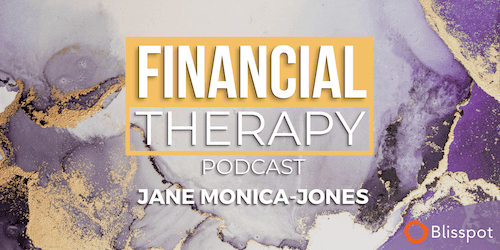Blisspot CEO Deborah Fairfull speaks with Jane Monica-Jones, Financial Therapist and a Blisspot Financial Wellbeing Expert about money, resiliency, and mental health.
Deborah: What is Financial Therapy?
Jane: Money and financial challenges can be a big source of stress and mental health issues for many people. Financial Therapy equips people to reach their financial goals, minimise unsupportive money habits, and build financial capability by thoughtfully addressing financial challenges through psychological, behaviour, and personal relationship hurdles.
Deborah: Why is Financial Therapy important?
Jane: We might be taught financial literacy skills, such budgeting and learning about different types of investment products, but like many things in life, knowing and doing it can be worlds apart. A lot of research shows that many people ‘know’ how to budget, but they rarely actually do it, often overspending, going into debt, and wondering why they don’t seem to be getting ahead financially. Our individual psychology and behaviours play a major part in how we ‘do’ money.
Money can be a tricky business. Largely in the most part because we are often unaware of the hidden psychological drives and motivations that direct our decisions with money both positively and negatively.

Deborah: What led you to doing this type of work?
Jane: The short answer? Being terrible with money! The long answer is that I knew I was an intelligent and resourceful person, who was competent in many areas of my life… except for money. My bank account often see-sawed up and down which made it impossible for me to contemplate long term goals like home ownership and financial independence. It caused a lot of heartache for many years, until finally I retrained as a therapist focussing on people’s challenges and issues with finances.
Deborah: What are the topics your podcasts cover?
Jane: To achieve financial wellbeing and financial resiliency we need to go beyond the narrative that being with good finances is just saving and budgets.We need to integrate soft skills into our financial capability strategies such as agency, empowerment, problem solving, creativity, risk taking, motivation, and the capacity to rebound from setbacks.
That’s why through Financial Therapy we have a bigger conversation about us and money. We talk money and neuroscience, how we can protect ourselves when in relationship with others and money, what are some of the structural issues that stop us from thriving and head out from there.

Deborah: What are the key benefits of the work you do?
Jane: Working for many years as a financial therapist, one thing that has become very clear to me and that is that our financial wellbeing impacts our mental health and that our mental health impacts our financial wellbeing. From all the support I have given to my clients over the years I have seen phenomenal shifts going from struggling to thriving, not only in their financial situation but also their overall wellbeing.
To learn more about developing financial well-being see Jane’s: Financial Therapy Podcast








